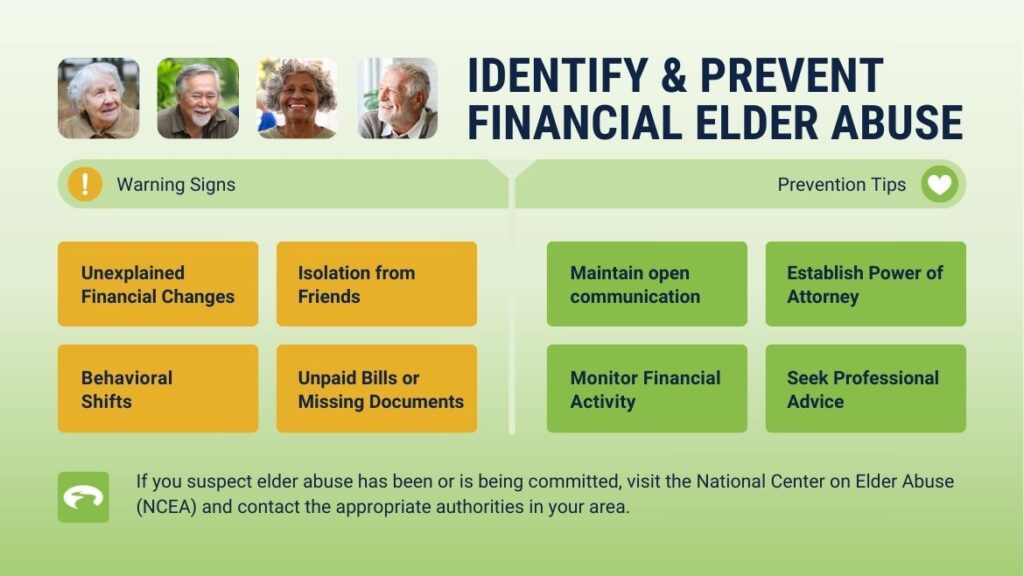As our loved ones age, it’s crucial to ensure they’re protected not only physically but also financially. Identifying and preventing financial elder abuse requires vigilance, education, and proactive measures.
If you suspect elder abuse has been or is being committed, visit the National Center on Elder Abuse (NCEA) and contact the appropriate authorities in your area.
Identifying Financial Elder Abuse
Financial elder abuse can take various forms, including fraud, identity theft, and exploitation. Here are some warning signs that could indicate someone you know is being victimized:
Unexplained Financial Changes:
Sudden withdrawals, transfers, or large purchases without reasonable explanation are a potential red flag for financial exploitation.
Isolation:
Perpetrators often isolate seniors from family and friends in an effort to maintain control over them and their finances.
Unpaid Bills or Utilities:
Neglected bills (despite their ability to make prompt payments) may signal financial mismanagement.
Changes in Behavior:
Abrupt changes in behavior, such as increased anxiety or fearfulness, could point to threatening or manipulative behaviors taking place.
Missing Belongings or Documents:
Disappearance of valuable items or important documents like wills, titles, or financial statements may suggest theft or fraud.
New “Friends” or Caregivers:
Be wary and watchful if a new acquaintance or caregiver shows undue interest in finances or assets.
Signatures on Documents:
Seniors may be coerced into signing documents they don’t understand or haven’t thoroughly vetted, such as contracts or deeds.
Preventing Financial Elder Abuse
No one deserves to live with the aftermath of: “What could I have done differently to prevent this from happening?” Here, we offer some actionable steps you can take to avoid worst case scenarios.
Stay Informed:
Educate yourself and your loved ones about common scams and frauds that specifically target seniors. Resources like the Consumer Financial Protection Bureau (CFPB) and the National Council on Aging (NCOA) offer useful guides and best practices:
Maintain Open Communication:
Encourage open and ongoing communication with your loved ones about their finances. Make them aware of the warning signs of financial abuse and reassure them that they can come to you for support without fear of judgment.
Monitor Financial Activity:
Regularly review bank statements, bills, and financial transactions for any unusual activity—it’s better to be overly cautious vs. caught unaware. Set up account alerts for large withdrawals or unusual spending patterns.
Seek Professional Advice:
Consult with financial advisors or elder law attorneys to create a comprehensive estate plan and implement safeguards against financial exploitation.
Report Suspected Abuse:
If you suspect that a senior is being financially exploited, don’t hesitate to report it. Contact adult protective services, law enforcement, or the National Center on Elder Abuse (NCEA).
Are you providing care for or financially supporting a senior family member? If so, it’s important to remember that putting on your own oxygen mask helps you as you support others.
In addition to the Identity Theft and Fraud Protection information and Interactive Budgeting Worksheet we included above, you can also connect to free financial counseling at GreenPath. Our empathetic and certified counselors can help you revisit your budget to accommodate caregiving costs. You are not alone.

First published by Tara Spicer and our trusted financial wellness partners at Greenpath.com
The material and information contained here is for general information purposes only. You should not rely upon the material or information on the website as a basis for making any business, legal, or any other decisions.
Whilst we endeavor to keep the information up to date and correct, PFCU makes no representations or warranties of any kind, express or implied about the completeness, accuracy, reliability, suitability, or availability with respect to the website or the information, products, services or related graphics contained on the website for any purpose. Any reliance you place on such material is therefore strictly at your own risk.



